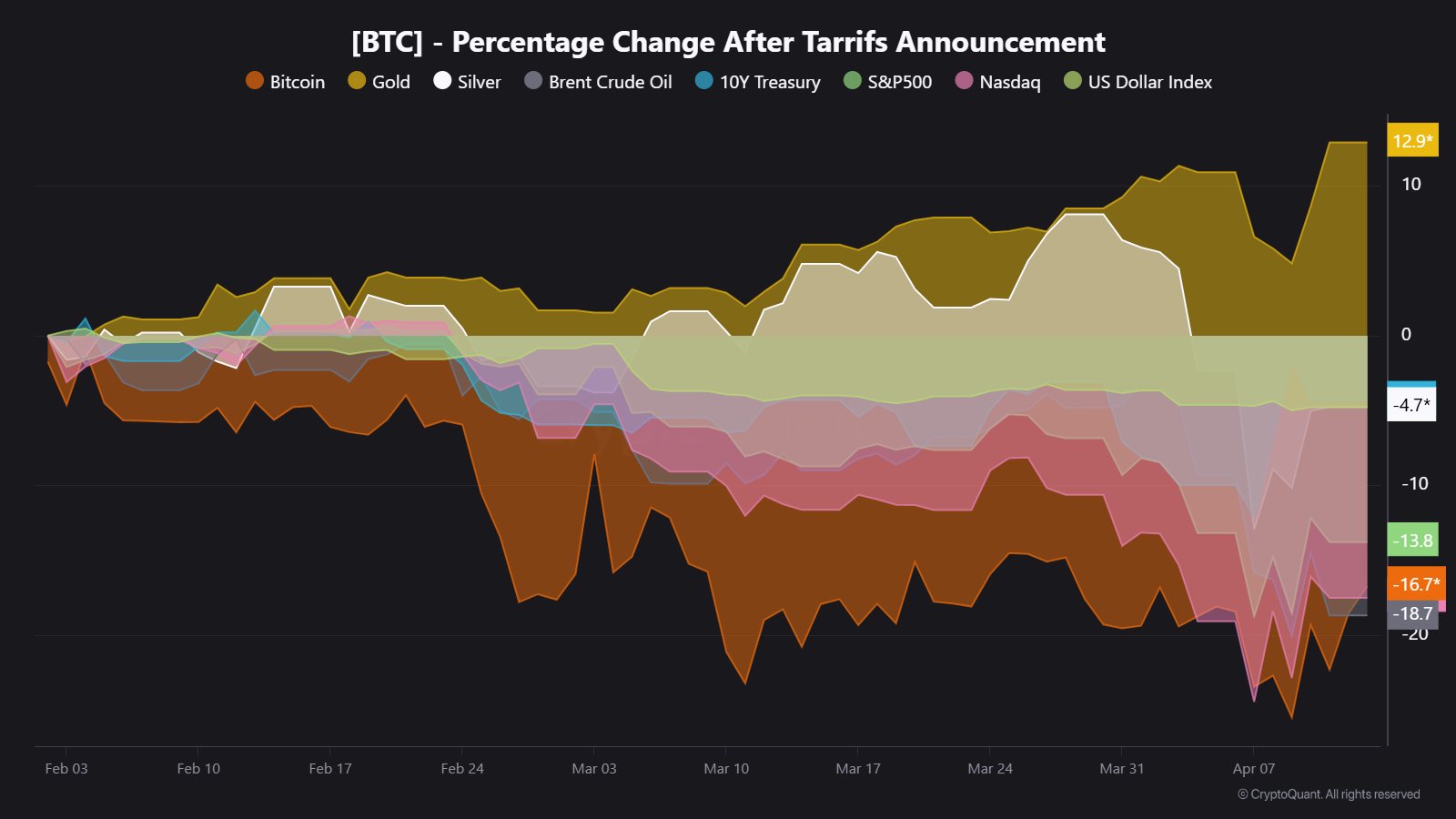Bitcoin Falls 16.7% Since U.S. Tariff News, Raising Questions Over Safe-Haven Status
Key Points:
-
Bitcoin has fallen 16.7% since the U.S. tariff announcement, underperforming gold, the S&P 500, and the U.S. Dollar Index.
-
China’s local governments are selling seized crypto through private firms, raising transparency and governance concerns.
-
China holds ~190,000 BTC, second only to the U.S., and continues to study crypto regulation through legal and financial institutions.
Bitcoin has dropped 16.7% since the announcement of new U.S. tariffs, reflecting ongoing volatility amid rising geopolitical and economic uncertainty. While the cryptocurrency has recovered from a sharper 26.7% decline at its lowest point, its performance continues to trail behind traditional assets often viewed as safe havens.
According to CryptoQuant, Bitcoin’s price correction places it between the Nasdaq (-17.5%) and oil markets, with gold (+12.9%) standing out as the best-performing asset over the same period.
Other major benchmarks such as the S&P 500 (-13.8%), silver (-4.8%), and the U.S. Dollar Index (-4.8%) also outperformed Bitcoin.
The comparison has reignited debate over Bitcoin’s role as a hedge or safe-haven asset. While often promoted as “digital gold” due to its fixed supply and decentralization, Bitcoin’s current behavior during macroeconomic stress has yet to consistently align with that narrative.

Seized Crypto Sales in China Raise Transparency Concerns
Meanwhile, in China, local governments have been liquidating seized cryptocurrencies to boost public funds amid economic slowdown. According to a Reuters investigation, municipalities have engaged private tech firms to sell confiscated crypto assets through offshore platforms, raising questions over regulatory transparency and governance.
One example cited in the report involves Shenzhen-based Jiafenxiang, a company that has facilitated over $408 million in crypto sales since 2018 on behalf of regional governments in Jiangsu province. Transaction documents show that proceeds from these sales were converted into yuan and transferred to government finance bureau accounts.
Though mainland China maintains a strict ban on cryptocurrency trading and mining, it permits companies to act as agents in the liquidation of seized assets. Legal scholars have cautioned that this practice — while technically legal — risks opaque processes and possible corruption without formal oversight mechanisms in place.
China remains a significant holder of Bitcoin, with approximately 190,000 BTC, making it the second-largest national holder after the United States, according to BitcoinTreasuries.net.

The handling of crypto assets in legal and judicial contexts is also becoming a central topic in China’s legal system. In recent months, representatives from the Supreme People’s Court, legal scholars, and central banking officials have convened to study the treatment of crypto in court cases and its implications for national financial stability.
The People’s Bank of China (PBOC) reaffirmed its stance in its 2024 financial stability report, emphasizing the need for improved international crypto regulation frameworks, signaling continued interest in global-level governance solutions for digital assets.
Disclaimer: The content of this article solely reflects the author's opinion and does not represent the platform in any capacity. This article is not intended to serve as a reference for making investment decisions.
You may also like
CoinShares: Global digital asset ETP inflows reached $2.4 billion this week
Goldman Sachs chief economist: The dollar will fall further
A whale is suspected of selling 100 WBTC to partially take profits, worth about $9.19 million
